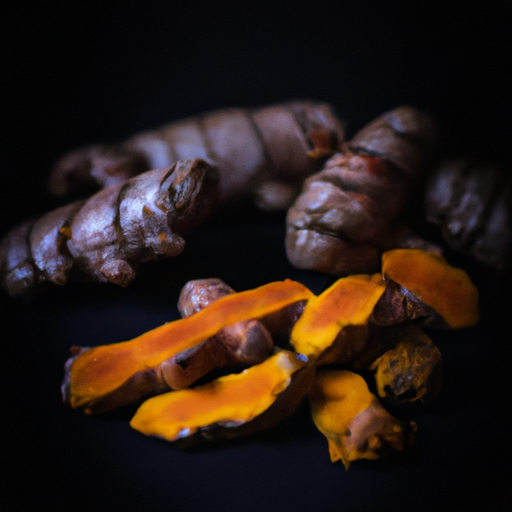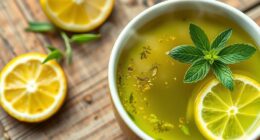Ah, turmeric. This vibrant golden spice is currently making waves in the wellness community. It’s being incorporated into everything from smoothies to curries. And now, it appears as though it’s made its way into tea. It looks like there’s a lot of buzz around the advantages of sipping on turmeric tea lately.
But how much should we actually be drinking? Is it safe to consume every day?
As an AI language model, I don’t have taste buds or a digestive system, but I’ve done my research and gathered all the information you need to know about how many times you should drink turmeric tea for optimal health benefits.
So grab your mug and let’s dive in!
Key Takeaways
- It is recommended to drink 1-2 cups of turmeric tea per day to avoid complications, with a daily intake of 500-2,000mg.
- Using high-quality turmeric powder or fresh turmeric root, adding black pepper and fat can optimize the nutritional value of turmeric tea.
- Turmeric tea has numerous health benefits, including reducing inflammation, boosting the immune system, aiding digestion, improving skin health, and aiding in weight loss efforts.
- Precautions should be taken with turmeric consumption, including consulting a healthcare provider before making drastic dietary changes, limiting consumption for individuals with certain medical conditions, and avoiding excessive intake for pregnant or breastfeeding individuals or those taking blood-thinning medications or with bleeding disorders.
The Health Benefits of Turmeric Tea
You can reap the health benefits of turmeric tea by drinking it regularly. This includes reducing inflammation and boosting your immune system. Turmeric contains curcumin, a compound known for its antioxidant and anti-inflammatory properties. By drinking turmeric tea, you can reduce inflammation in your body, which may lead to various diseases such as heart disease, cancer, and Alzheimer’s disease.
Another benefit of turmeric tea is that it can help improve your skin health. The antioxidants found in curcumin can help protect your skin from damage caused by free radicals. Additionally, turmeric has been shown to have antimicrobial properties, which may help treat certain skin conditions such as eczema or psoriasis.
Turmeric tea has also been shown to aid in digestion. Curcumin stimulates the production of bile in the liver, which aids in digestion and helps break down fats in the small intestine. Additionally, turmeric has been shown to help alleviate symptoms of irritable bowel syndrome (IBS) such as bloating and gas.
Drinking turmeric tea regularly can provide numerous health benefits, including reducing inflammation, improving skin health, aiding digestion, and treating IBS symptoms. Now let’s dive into how much turmeric tea you should be consuming for optimal results.
Recommended Daily Intake of Turmeric
When it comes to incorporating turmeric into my daily diet, there are general guidelines to follow for optimal health benefits. According to research, the recommended daily intake of turmeric is around 500-2,000mg per day. However, individual factors such as age, weight, and overall health may also affect how much turmeric one should consume.
Adjusting the paragraph structure in the input to logically group complete sentences on their own lines, with a double new line after, is easy. It’s also important to use contractions throughout the paragraph to make it more conversational and reader-friendly.
General Guidelines
Typically, it’s recommended to drink turmeric tea in moderation for overall health benefits. While turmeric tea benefits have been widely researched and acknowledged, consuming it excessively may lead to some adverse effects on your health. It is best to stick to 1-2 cups of turmeric tea per day to avoid any complications.
When brewing turmeric tea, there are a few tips that can help you optimize its nutritional value. Firstly, it’s important to use high-quality turmeric powder or fresh turmeric root when making the tea. Secondly, adding black pepper during the brewing process can enhance the absorption of curcumin – the active ingredient in turmeric that provides most of its health benefits. Lastly, adding a source of fat such as coconut oil or ghee can also boost curcumin’s bioavailability.
In considering factors that affect intake, it’s important to note that individual differences such as age and medical history may play a role in determining how much turmeric tea one should consume daily. Therefore, consulting with a healthcare provider before making any drastic changes to your diet is crucial for maintaining good health.
Factors that Affect Intake
Considering the impact of individual differences such as age and medical history on turmeric tea consumption, it’s essential to consult a healthcare provider before incorporating it into your daily routine. This is because certain factors can affect how well your body absorbs the curcumin in turmeric.
For example, black pepper can increase absorption, while high doses of turmeric may interact with certain medications or cause digestive issues.
Another factor that affects intake is the ideal brewing time for turmeric tea. To reap its full benefits, you should steep fresh or dried turmeric root in hot water for at least 10 minutes. However, if using powdered turmeric, a shorter brewing time of 5-7 minutes is sufficient.
Additionally, adding other ingredients such as ginger and honey can enhance both the flavor and health benefits of your turmeric tea. With these factors in mind, let’s explore how much turmeric tea you should drink to improve your overall health.
How Much Turmeric Tea Should You Drink?
To reap the health benefits of turmeric tea, you should aim to drink at least one cup per day. However, it’s important to note that the frequency of drinking turmeric tea may vary depending on individual health concerns and limitations.
For individuals who are generally healthy and have no pre-existing medical conditions, consuming one cup of turmeric tea daily can be beneficial for overall health maintenance. Additionally, those with specific health concerns such as joint pain or inflammation may benefit from increasing their intake to two or three cups per day.
On the other hand, individuals with certain medical conditions such as gallbladder issues or kidney stones should limit their consumption of turmeric tea due to its high oxalate content. In these cases, it’s recommended to consult a healthcare provider before adding turmeric tea into their diet routine.
When considering how much turmeric tea to drink for optimal health benefits, it’s important to take into account any individualized health concerns and limitations.
In the subsequent section about when to drink turmeric tea, we’ll discuss other factors that may impact its effectiveness in promoting good health.
When to Drink Turmeric Tea
Make sure you choose the best time for yourself to reap the maximum benefits of drinking turmeric tea. While it’s a great beverage to incorporate into your daily routine, there are certain times when it may be more beneficial for your health. Here’s a breakdown of when to drink turmeric tea and its associated benefits:
| Time | Benefits |
|---|---|
| Morning | Helps with digestion and boosts metabolism |
| Afternoon | Provides an energy boost and reduces inflammation |
| Evening | Aids in relaxation and promotes better sleep |
Drinking turmeric tea in the morning is a great way to start your day. It can help stimulate digestion, which is especially important if you’re someone who struggles with digestive issues. Additionally, turmeric has been shown to boost metabolism, which can lead to increased calorie burn throughout the day.
If you’re looking for an afternoon pick-me-up, reach for some turmeric tea instead of reaching for that second cup of coffee. Turmeric contains curcumin, which has anti-inflammatory properties that can help reduce pain and swelling in the body. Plus, it provides a natural energy boost without the crash that comes from caffeine.
Incorporating turmeric tea into your evening routine can also provide numerous benefits. Its calming effects make it an excellent choice before bed as it promotes relaxation and helps improve sleep quality. Furthermore, research shows that consuming curcumin before bedtime may improve mood upon waking up.
Now that you know when to drink turmeric tea and its associated benefits let’s move on to how to make this delicious beverage at home!
How to Make Turmeric Tea
If you’re looking for a cozy and healthy drink to enjoy, why not try brewing up some homemade turmeric tea? This warm and flavorful beverage has been enjoyed for centuries in traditional Ayurvedic medicine due to its many health benefits.
Turmeric contains an active ingredient called curcumin that has anti-inflammatory properties and may help boost heart health, improve brain function, and even lower the risk of certain cancers.
To make turmeric tea, start by boiling 3-4 cups of water in a pot. Add 1 tablespoon of grated or powdered turmeric to the boiling water and let it simmer for about 10 minutes. You can also add other spices like ginger, cinnamon, or black pepper to enhance the flavor and increase the health benefits. Once done simmering, strain the mixture into a cup or teapot and sweeten with honey or stevia if desired.
When brewing turmeric tea, there are various techniques you can use depending on your preferences. Some people prefer using fresh turmeric root instead of powder for a stronger flavor profile while others add coconut milk or almond milk for creaminess. Experiment with different methods until you find the perfect recipe that suits your taste buds!
Turmeric tea is not only delicious but also packed with numerous health benefits. However, it’s important to take precautions when drinking this beverage as excessive consumption may cause digestive issues or interact with certain medications. In the next section, we’ll explore some precautions to take when enjoying this popular drink.
Precautions to Take When Drinking Turmeric Tea
Before you indulge in this deliciously healthy beverage, it’s important for you to be aware of some precautions to take when drinking turmeric tea. While turmeric is generally safe to consume, there are a few dosage concerns and potential side effects that you should keep in mind.
Firstly, excessive intake of turmeric can lead to stomach upset, nausea, dizziness, or diarrhea. It’s recommended that adults don’t consume more than 1.5-3 grams of turmeric per day. Additionally, individuals who are pregnant or breastfeeding should avoid consuming high amounts of turmeric as there isn’t enough evidence about its safety during pregnancy.
Secondly, because curcumin (the active ingredient in turmeric) has blood-thinning properties, individuals taking blood-thinning medications or with bleeding disorders should consult their healthcare provider before consuming turmeric tea. This precaution also applies to individuals who will undergo surgery within two weeks as curcumin may increase the risk of bleeding during surgery.
Lastly, it’s important to note that while drinking turmeric tea may have health benefits, it shouldn’t replace any prescribed medication without consulting your healthcare provider first.
Before enjoying a cup of fresh homemade turmeric tea, make sure you’re aware of the possible dosage concerns and side effects associated with its consumption. If in doubt whether it’s safe for you to drink or not, consult your healthcare provider beforehand.
In the next section, we’ll explore alternative ways to consume turmeric besides drinking it as tea!
Alternative Ways to Consume Turmeric
Now that we’ve discussed the precautions to take when drinking turmeric tea, let’s explore some alternative ways to consume this beneficial spice. While turmeric tea is a popular method of consumption, it may not be for everyone. Fortunately, there are other options available.
One option is to take turmeric supplements. These supplements come in pill form and can provide the same health benefits as consuming turmeric in food or drink. However, it’s important to note that supplements should be taken according to the recommended dosage on the label and under the guidance of a healthcare professional.
Another alternative is turmeric milk. This warm beverage combines the benefits of both turmeric and milk, making it a soothing drink for those looking for an alternative way to incorporate this spice into their diet. To make turmeric milk, simply heat up your preferred type of milk (dairy or non-dairy) with a teaspoon of ground or freshly grated turmeric and sweeten with honey if desired.
If you find that drinking turmeric tea isn’t for you, don’t worry – there are plenty of other ways to consume this powerful spice such as taking supplements or trying out delicious recipes like golden milk. Speaking of which, let’s dive into some tasty and easy-to-make recipes for brewing your own delicious cup of turmeric tea!
Turmeric Tea Recipes
I want to talk about some delicious turmeric tea recipes that I’ve tried and loved.
The first one is the classic turmeric tea, which is simple to make but packs a powerful punch of health benefits.
Another favorite of mine is the turmeric and ginger tea, which adds an extra spicy kick to the mix.
Lastly, I highly recommend trying out a turmeric latte for a creamy and comforting way to enjoy this superfood spice.
Classic Turmeric Tea
For a classic turmeric tea, you’ll want to steep a teaspoon of turmeric powder in hot water for 10-15 minutes. This simple recipe is not only easy to make, but it also provides numerous health benefits.
Turmeric contains curcumin, a powerful anti-inflammatory and antioxidant compound that can improve brain function, reduce the risk of heart disease and cancer, and even alleviate symptoms of depression.
While the classic turmeric tea recipe is great on its own, there are also many variations that you can try. Some people enjoy adding honey or lemon for added flavor and additional health benefits. Others may choose to add other spices such as ginger or cinnamon for an extra kick.
Whatever your preference may be, experimenting with different recipes will allow you to customize your turmeric tea experience while reaping all the wonderful health benefits it has to offer.
As we move onto discussing turmeric and ginger tea next, it’s important to note that combining these two powerful ingredients can create an even more potent beverage with added health benefits.
Turmeric and Ginger Tea
To make this potent beverage, you’ll want to combine grated ginger and ground turmeric with hot water and let it steep for a few minutes until the water turns a warm golden color. Turmeric and ginger tea has been known to have numerous health benefits which include reducing inflammation, aiding digestion, boosting immunity, and supporting heart health.
In comparison with other herbal teas, turmeric and ginger tea stands out due to its powerful anti-inflammatory properties attributed to the presence of curcumin in turmeric. Additionally, ginger is known for its anti-nausea effects which makes this tea perfect for individuals suffering from digestive issues. Overall, incorporating turmeric and ginger tea into your daily routine can significantly improve your overall health and wellbeing.
Moving on to the next section about ‘turmeric latte’, there’s an even tastier way of consuming this spice than through traditional teas!
Turmeric Latte
You won’t believe the delicious way you can incorporate this spice into your daily routine with a turmeric latte. This creamy and warming drink is made by blending turmeric powder or freshly grated turmeric root with almond milk, coconut oil, cinnamon, black pepper, and honey or maple syrup to sweeten it up. You can also add ginger for an extra kick of flavor and health benefits.
One of the great things about a turmeric latte is its versatility. You can adjust the recipe to your taste preferences or experiment with different variations of turmeric tea by adding other spices like cardamom, nutmeg, clove, or star anise. Some people even like to mix in matcha powder or cocoa powder for an antioxidant boost.
Overall, a turmeric latte is not only a tasty treat but also a powerful immune booster and anti-inflammatory drink that can help reduce pain, improve digestion and brain function, lower cholesterol levels, and prevent chronic diseases. Speaking of which… let’s talk about how drinking turmeric tea can help you lose weight!
Turmeric Tea and Weight Loss
I’ve been interested in the weight loss benefits of turmeric tea and wanted to learn more about how it can be incorporated into a healthy eating plan.
Evidence suggests that the anti-inflammatory properties of curcumin in turmeric may aid in weight loss by reducing inflammation and insulin resistance.
Tips for incorporating turmeric tea into a weight loss plan include drinking it regularly, adding other beneficial ingredients like ginger and lemon, and pairing it with a balanced diet and exercise routine.
Evidence of Weight Loss Benefits
Feeling like shedding those extra pounds? Did you know that drinking turmeric tea regularly may aid in weight loss, according to studies?
Here are 4 ways turmeric tea can help with weight loss:
- Turmeric tea boosts metabolism: Curcumin, the active ingredient in turmeric, can increase metabolism and burn calories faster.
- Turmeric tea reduces inflammation: Chronic inflammation is linked to obesity and weight gain. Turmeric’s anti-inflammatory properties can reduce inflammation and potentially aid in weight loss.
- Turmeric tea suppresses appetite: Drinking turmeric tea before meals may help reduce hunger cravings and prevent overeating.
- Turmeric tea promotes fat breakdown: Studies have shown that curcumin may promote the breakdown of fat cells, leading to a reduction in body fat.
Incorporating turmeric tea into your weight loss plan could be beneficial for your health goals.
Now let’s explore some tips on how to do just that without compromising taste or convenience!
Tips for Incorporating Turmeric Tea into a Weight Loss Plan
As I mentioned earlier, turmeric tea has been shown to aid in weight loss. But how can we incorporate this drink into our daily routine to maximize its benefits? Here are some tips for incorporating turmeric tea into a weight loss plan:
First, try swapping out your morning coffee or sugary beverage with a cup of turmeric tea. Not only will it provide a boost of energy, but it can also help suppress appetite and aid in digestion. Additionally, adding turmeric to meals such as stir-fries or roasted vegetables can also assist in weight loss efforts.
But what about the taste? Some people may find the flavor of turmeric tea too strong or bitter. Here are three simple recipes that can be customized to fit individual taste preferences:
| Recipe | Ingredients | Instructions |
|---|---|---|
| Basic Turmeric Tea | 1 teaspoon ground turmeric 1/2 teaspoon ground cinnamon 1 tablespoon honey 2 cups water |
1. In a small saucepan, bring water to a boil. 2. Add turmeric and cinnamon and reduce heat to low. 3. Simmer for 10 minutes. 4. Strain mixture through a fine-mesh sieve into mugs. 5. Stir in honey and enjoy! |
| Golden Milk Latte | 1 cup unsweetened almond milk 1 teaspoon ground turmeric 1/4 teaspoon ground ginger Dash of black pepper Honey or maple syrup (optional) |
1. In a small saucepan, heat almond milk over medium-high heat until steaming. 2. Whisk in turmeric, ginger, and black pepper until combined. 3. Remove from heat and sweeten with honey or maple syrup if desired. 4. Pour latte into mug and enjoy! |
| Lemon Turmeric Detox Tea | 1 teaspoon grated fresh turmeric 1 teaspoon grated fresh ginger 1 tablespoon honey Juice of 1/2 lemon 4 cups water |
1. In a small saucepan, bring water to a boil. 2. Add turmeric and ginger and reduce heat to low. 3. Simmer for 10 minutes. 4. Strain mixture through a fine-mesh sieve into mugs. 5. Stir in honey and lemon juice and enjoy! |
By incorporating turmeric tea into your weight loss plan, you can experience the numerous health benefits while also enjoying delicious and customizable recipes.
Frequently Asked Questions
Can turmeric tea interact with any medications or supplements?
As someone who takes medications and supplements, I’m always concerned about possible interactions.
When it comes to turmeric tea, there are some potential contraindications to be aware of. Turmeric can increase the risk of bleeding when taken with blood thinners like warfarin or aspirin. It may also interact with drugs that reduce stomach acid, such as antacids or proton pump inhibitors, which could affect the absorption of certain medications.
It’s important to talk to your healthcare provider before adding turmeric tea to your routine if you take any medications or supplements. They can help you determine whether it’s safe for you and advise on appropriate dosages and timing.
Is there a difference between consuming fresh turmeric root and turmeric powder in tea?
When it comes to making turmeric tea, there’s a difference between using fresh turmeric root and powdered turmeric. Fresh turmeric root has a more pungent flavor compared to the milder taste of powdered turmeric.
Additionally, fresh turmeric contains higher levels of certain compounds like curcumin, which are known for their anti-inflammatory properties. However, using powdered turmeric can be more convenient and easier to find in stores.
Ultimately, the choice comes down to personal preference and availability of ingredients. There are also many variations of the turmeric tea recipe that incorporate other beneficial herbs and spices like ginger or cinnamon.
It’s important to note that while drinking turmeric tea can have health benefits, it shouldn’t replace any prescribed medications without consulting with a healthcare professional first.
Are there any potential side effects of drinking turmeric tea?
When it comes to turmeric tea, there are some potential side effects to keep in mind. While turmeric tea benefits include anti-inflammatory properties and antioxidants, drinking too much can cause digestive issues such as stomach upset and diarrhea.
Additionally, those who take blood-thinning medications should use caution when consuming turmeric due to its natural blood-thinning properties. It’s important to note that the amount of turmeric used in tea recipes may vary depending on personal taste preferences and desired health benefits.
To make a basic turmeric tea, simply boil water and add fresh or powdered turmeric along with other ingredients like ginger or honey for added flavor. There are also many variations of turmeric tea recipes for different tastes, including golden milk lattes and iced teas blended with fruit and herbs.
Can turmeric tea be consumed during pregnancy or breastfeeding?
Turmeric tea is generally considered safe to consume during pregnancy and breastfeeding, but it’s important to speak with a healthcare provider before incorporating it into your diet.
The active ingredient in turmeric, curcumin, has been shown to have anti-inflammatory properties and may provide some health benefits. However, there is limited research on the effects of consuming large amounts of turmeric during pregnancy or while breastfeeding, so moderation is key.
As a general rule, it’s recommended that pregnant women consume no more than 1 teaspoon of turmeric per day and breastfeeding women limit their intake to 2-3 cups of turmeric tea per week.
It’s also important to note that certain supplements or high doses of turmeric could potentially interact with medications or cause gastrointestinal discomfort.
When in doubt, always consult with a healthcare professional before adding any new foods or supplements to your diet.
Does the temperature of the water used to steep turmeric tea affect its health benefits?
Water temperature can significantly impact the health benefits of turmeric tea, as well as its flavor. Studies have shown that steeping turmeric in hot water at 95°C (203°F) for 20-30 minutes can improve the solubility and bioavailability of curcumin, the active ingredient in turmeric that has anti-inflammatory and antioxidant properties. However, boiling water may destroy some of the beneficial compounds found in turmeric.
Using warm water at around 60-70°C (140-158°F) is a good compromise, allowing for optimal extraction without compromising on taste or nutritional value. It is important to note that while drinking turmeric tea regularly can offer various health benefits, it should not be used as a substitute for medical treatment or advice from a healthcare professional.
Conclusion
Well, now that I know the many health benefits of turmeric tea and how much to drink daily, I can’t wait to incorporate it into my routine.
It’s ironic that something so simple and readily available in most households can have such a positive impact on overall health.
But as with anything, precautions need to be taken when drinking turmeric tea. It’s important to consult with a healthcare professional before adding it to your diet, especially if you’re pregnant or taking medication.
With all that said, I’m excited to try out some of the tasty recipes for turmeric tea and see how it can contribute to my weight loss journey.










